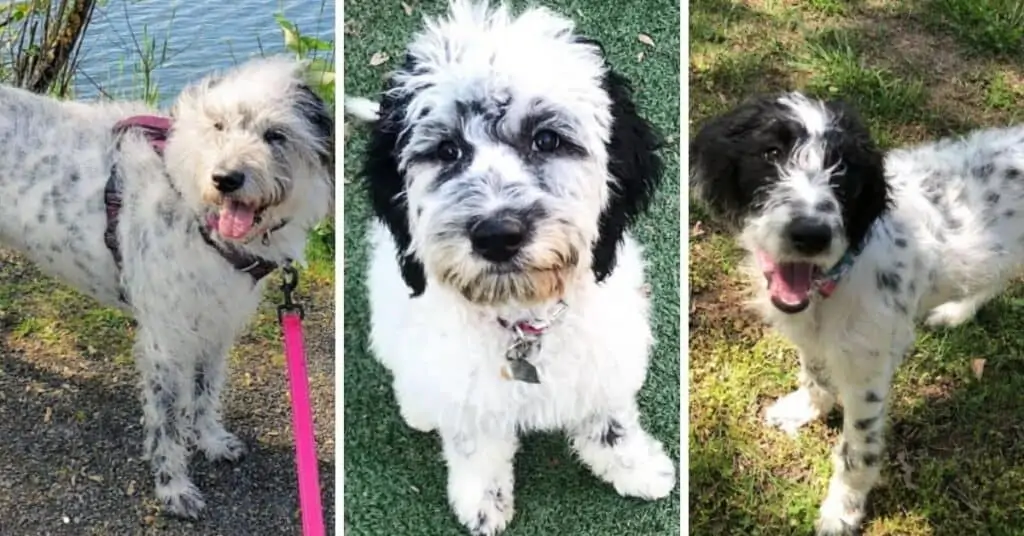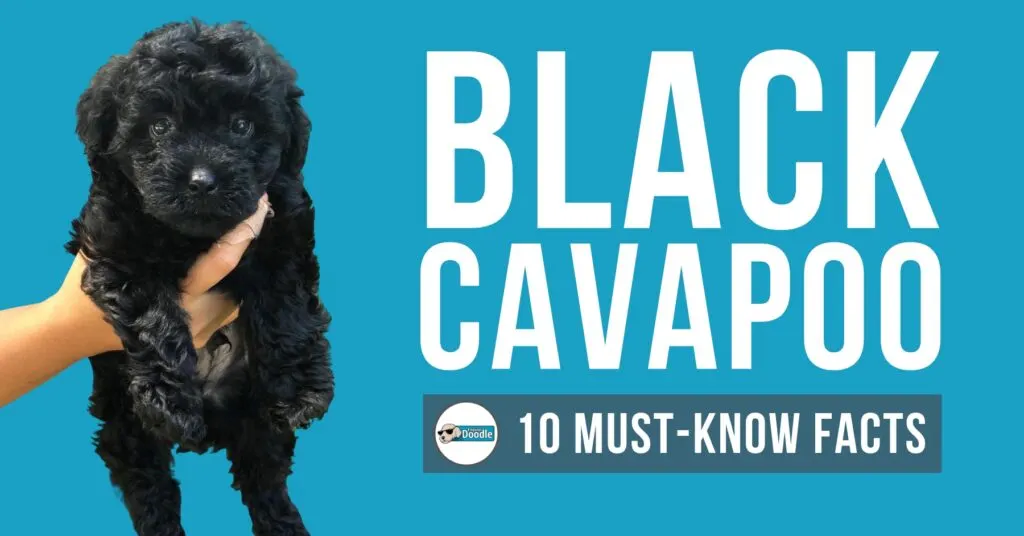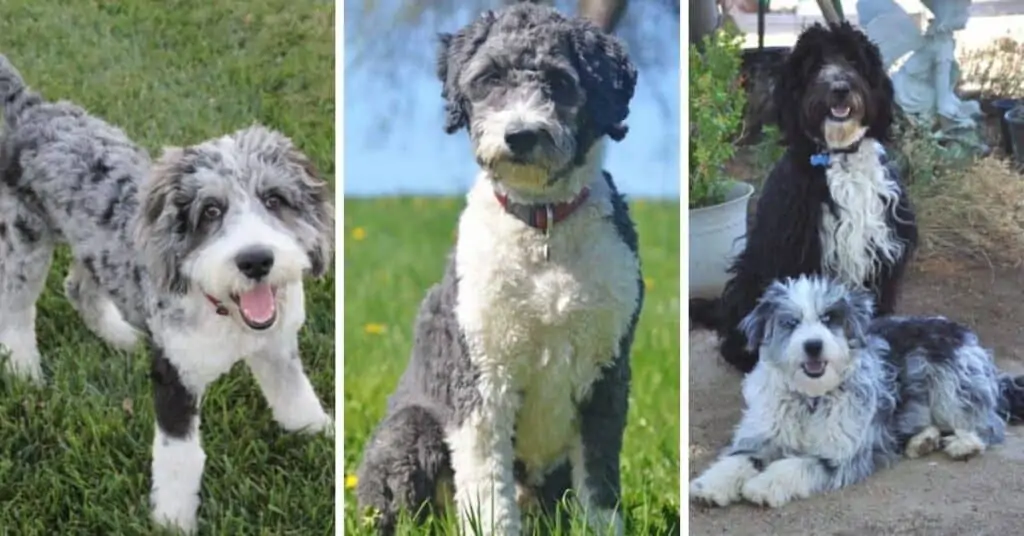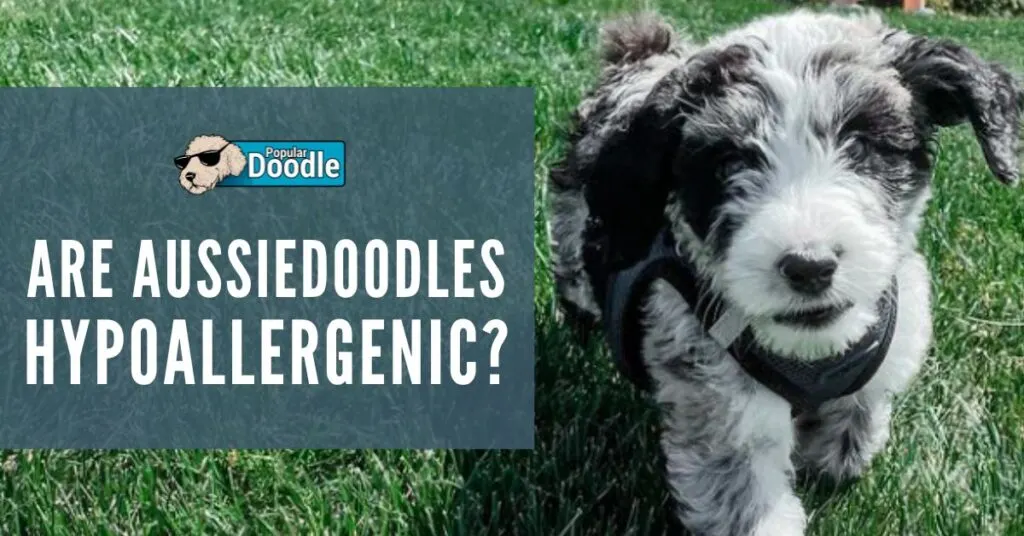
Since Poodles are hypoallergenic, many assume that Poodle mixes like the Aussiedoodle will also be. Some Aussiedoodle breeders advertise their puppies as hypoallergenic, while others say that’s impossible.
This debate makes it incredibly confusing for prospective owners with allergies to know whether an Aussiedoodle is a good fit for their family. So what’s the truth…are Aussiedoodles hypoallergenic?
While Aussiedoodles are NOT guaranteed to be hypoallergenic, they are typically a more allergy-friendly option than a purebred Australian Shepherd. We surveyed Aussiedoodle owners with allergies and found that 84% reported experiencing no symptoms due to their pet.
See the full results of our survey below…
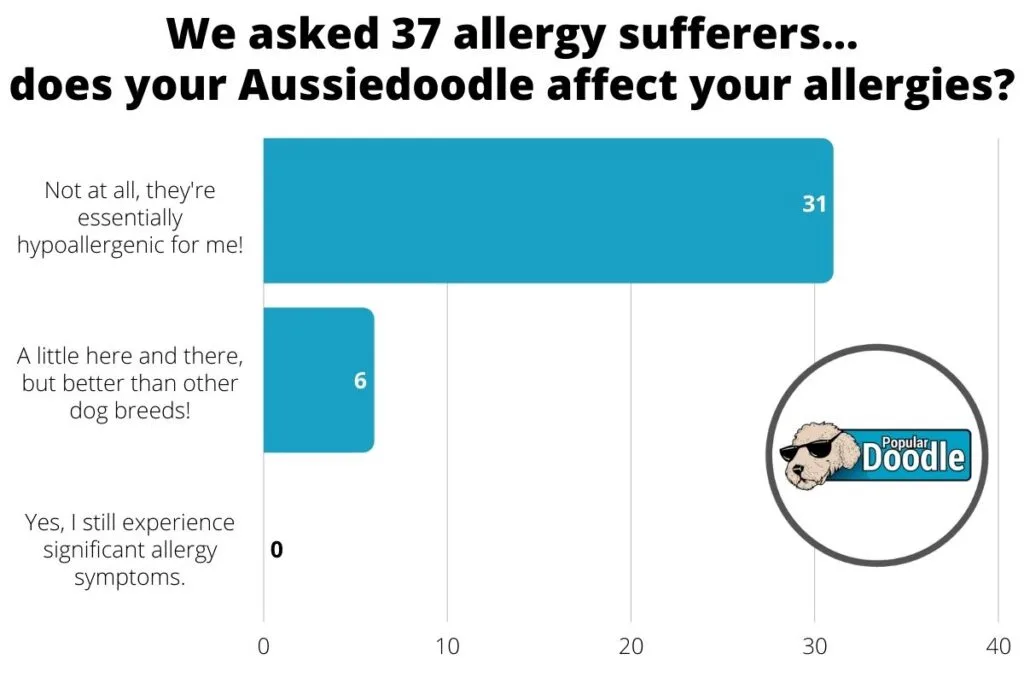
Survey Comments from Aussiedoodle Owners
“My husband really struggles when we go to the training place. So many other dogs. Even with a mask on.”
Interpreting the Survey Results
From this data, we can clearly see two things…
From the results of this survey, you can see that most allergy sufferers don’t experience symptoms from their Aussiedoodle. However, while they may be in the minority, there are still a decent amount of allergy sufferers who experience symptoms due to their Aussiedoodle.
What does this all mean? If you have allergies, you are taking a risk by choosing to add an Aussiedoodle to your family.
The good news is that there are ways to “better your odds” of having an allergy-friendly Aussiedoodle and help manage your symptoms should you experience them.
For those with severe dog allergies, you’ll likely want to opt for a purebred breed that’s hypoallergenic or a mixed breed with two hypoallergenic parents like the Whoodle, Maltipoo, Schnoodle, or Yorkiepoo.
Can You Be Allergic to Aussiedoodles?
While Aussiedoodles are great for some allergy sufferers, others may still experience symptoms from this breed. 16% of Aussiedoodle owners with allergies report experiencing at least mild allergic reactions to their dog.
Allergies vary from person to person and from dog to dog. A person with allergies may be allergic to one Aussiedoodle but not another. Likewise, an Aussiedoodle may cause symptoms to one person but not another.
Are Aussiedoodles Allergy Friendly?
Aussiedoodles are an allergy-friendly breed, thanks to the influence of the hypoallergenic Poodle’s DNA. In our survey of 37 Aussiedoodle owners with allergies, nobody reported experiencing severe symptoms to their dog.
While this does not mean severe reactions are impossible, Aussiedoodles may be safer than many other breeds for those with mild or moderate allergies.
Causes of Aussiedoodles Allergies
Dander is the leading cause of allergies to Aussiedoodles or dogs of any breed. These little flakes of dead skin trigger many people’s allergies when dogs shed and spread them all around your home.
Non-shedding breeds like the Poodle limit the spread of dander, which is why many refer to them as “hypoallergenic.” Depending on how the genetics play out, Aussiedoodles can shed as little as the Poodle or as much as the Australian Shepherd—but they’ll usually fall somewhere in between.
This variability is why they’re considered allergy-friendly and not hypoallergenic.
Remember, dander is just one of the things that can cause a person to experience allergies. Some people experience symptoms due to dog saliva, which will occur regardless of breed. Similarly, dogs of any breed can spread pollen, grass, and other allergens throughout their daily lives.
Choosing an Allergy-Friendly Aussiedoodle
Narrow Down Your Search By Generation
The first step to improve your odds of having a hypoallergenic Aussiedoodle is selecting a generation that tends to inherit more Poodle traits.
If you’re unfamiliar with Aussiedoodle generations, check out our guide to understanding them here! Put simply, they describe how close a litter of Aussiedoodle puppies is genetically to a purebred Australian Shepherd and a purebred Poodle.
Generations with a higher theoretical percentage of Poodle DNA will be less likely to shed and, therefore, more likely to be allergy-friendly.
Check out this table which will explain more…
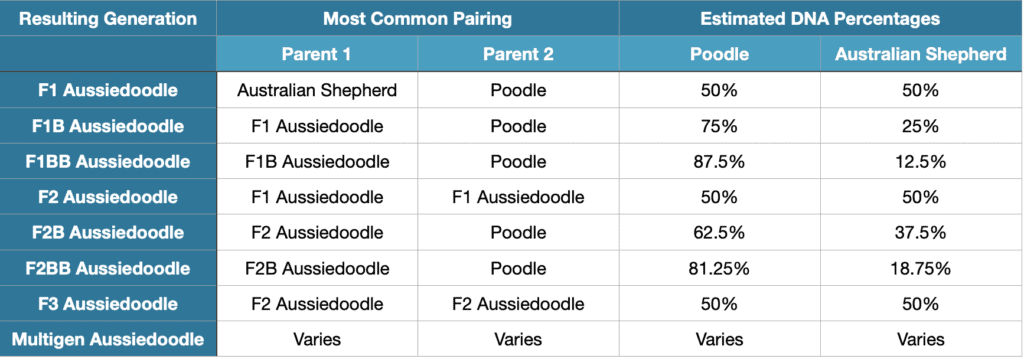
The most likely generations to be hypoallergenic are F1BB Aussiedoodles and F2BB Aussiedoodles. F1B Aussiedoodles and F2B Aussiedoodles can be decent options, but they are one “step down” when it comes to their percentage of Poodle DNA.
Compare Puppies
Even puppies from the same generation can vary in how allergy-friendly they are.
The first thing to note when comparing puppies is whether they have “furnishings.” These are the longer hairs around an Aussiedoodle’s eyebrows and mustache that give them the classic “teddy bear” appearance.
These furnishings indicate that your Aussiedoodle has inherited specific genes from the Poodle, making it more likely they’ll be low-shedding and allergy-friendly. Puppies without furnishings are said to have an improper coat.
Below, I’ve included a photo of a doodle with furnishings as well as a photo of one without. If you’re unsure whether a particular puppy has furnishings or not, your breeder should be able to assist.

Some breeders will offer “t-shirt tests” for free or for a small fee. They will provide you with an article of clothing that the puppies have been around to see if it triggers your allergies.
If a breeder offers it, I recommend taking advantage of this opportunity. However, if a breeder doesn’t mention it in person or on their website, you may want to ask if they’ll consider it!
Aussiedoodle Allergy Symptoms
Some people may only realize they have allergies to dogs after bringing an Aussiedoodle home from a rescue or breeder.
While reactions vary in type and severity, some common symptoms those with allergies to Aussiedoodles report are…
- Sneezing
- Runny Nose
- Itchy Skin
- Congestion
- Hives
Speak with your doctor as soon as you think you may be experiencing symptoms of dog allergies, as reactions can be more severe, including difficulty breathing.
I’m Allergic to My Aussiedoodle…Now What?
It can be heartbreaking to learn that you’re allergic to your new Aussiedoodle. You may feel like you have to choose between rehoming your dog or suffering for the entirety of your Aussiedoodle’s lifespan. Luckily, this doesn’t always have to be the case!
Here are a few simple ideas that may help reduce your symptoms…
Brush & Bathe Your Goldendoodle Often
- Brush your Aussiedoodle at least every other day. I recommend using the Chris Christensen Big G Slicker Brush to help you get down to your dog’s skin and pick up loose hair. If your Aussiedoodle sheds significantly, consider using this FURminator De-Shedding Tool along with brushing.
- Bathe your Aussiedoodle regularly, but not too often. Around once a month is an excellent frequency to eliminate loose fur but not dry out your dog’s skin. There are shampoos available that will help reduce shedding, like this one from Burt’s Bees!
- Vacuum regularly around your house using a model specifically designed for removing pet hair. This one from BISSELL uses a HEPA filter to reduce allergens in the air.
- Make an investment in an air purifier with a HEPA filter. Many great options are available on Amazon or at your local big-box retailer. Put one in your bedroom and one in the room of your house that you spend the most time in with your Aussiedoodle.
- Keep your Aussiedoodle out of your bedroom. Your body needs some allergen-free time to recuperate, so having your bedroom be a “dog-free zone” can help with that.
Related: 6 Things Dog Owners Should Be Cleaning Regularly (But Few Actually Do!)
Is an Aussiedoodle Right for You?
Aussiedoodles can be an excellent choice for those with mild allergies, thanks to their Poodle ancestry. However, you should always research and take the steps necessary to give yourself the best odds of an allergy-friendly Aussiedoodle.
For those with more severe reactions to dog dander, you’re likely better off opting for a fully non-shedding breed. Aussiedoodles are great dogs, but it’s not worth risking that you may have to rehome your new puppy if your symptoms are too severe.




